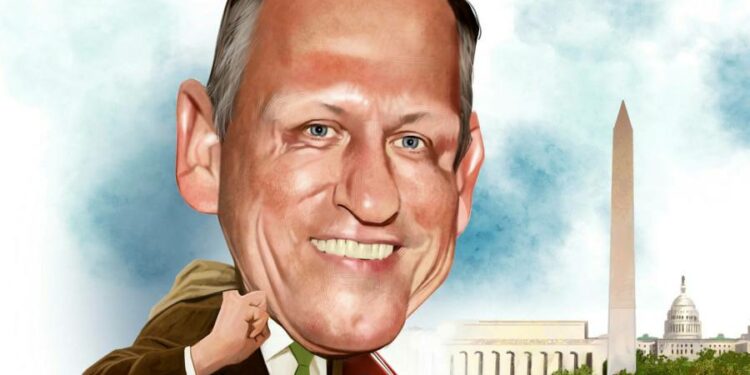Is Washington ready for Peter Thiel’s radical brand of anti-establishment thinking?
One of the most successful Silicon Valley investors and entrepreneurs of the last two decades, Thiel this week disclosed that he was stepping down after 17 years on the board of Facebook (or Meta, as it is now known). The departure, according to one person who knows him, was designed to give the social network’s first outside investor more freedom to expand his political influence, while protecting Meta from any backlash.
Thiel’s personal backing for Donald Trump in 2016 left many in liberal-leaning Silicon Valley aghast and — along with a personal fortune that Forbes puts at $2.6bn — has fuelled expectation that he is about to emerge as a powerful new force in rightwing politics.
“It’s a false narrative,” complains one ally — from an establishment which has long found it convenient to cast Thiel as a political manipulator. “They need some kind of bogeyman on the right.”
Yet the Meta split appears to signal a watershed. Thiel moved his base to Los Angeles in 2018 after tiring of what he claimed was Silicon Valley’s waning ambition and spends more time in his New York, Washington and Miami homes.
Thiel has always relished the part of contrarian outsider. Born in Germany and brought up in California, he did not follow the usual path to the tech industry’s top. A philosophy degree was followed by an early legal career, while his entrepreneurial endeavours were interspersed with a period at a hedge fund.
His business ventures included founding PayPal (where he was also CEO) and Palantir, a data analytics company whose work for the national security establishment has long antagonised civil liberties activists. Along the way, Thiel became a voluble exponent of a strand of libertarianism that pervades Silicon Valley. Zero to One, his handbook for budding founders, depicts such entrepreneurs as Randian heroes.
Blake Masters, his co-author and head of Thiel’s private foundation, is contesting the Arizona Republican Senate primary, backed by $10mn of Thiel’s cash. Thiel has thrown the same amount behind JD Vance, author of Hillbilly Elegy and formerly at the Thiel-founded Mithril Capital, in a Senate seat race in Ohio. These splashy contributions, among others, have made him the third-biggest backer of federal candidates in this year’s elections.
Thiel has a deep interest in challenging conventional thinking, according to people who have worked with him. At dinners at the home he shares with his husband Matt Danzeisen and their daughter, “you’d spend three and a half hours debating the strangest things”, one says. A typical subject: if there was an alien invasion, how would you reach diplomatic common ground?
Behind all this lie deep personal beliefs. Thiel is a committed Christian, and his worldview was shaped by French philosopher René Girard, who he studied under at Stanford University. According to Girard’s mimetic theory, most people’s desires are copied from others, a habit that ultimately leads to conflict. Only true originality — in Thiel’s view, fuelled by technology innovation — can carry humanity beyond these destructive limits.
“It’s a Plato/Socrates thing,” says one ally. “Everyone who is close to [Thiel] knows Girard inside and out.” Ironically, that hints at an intellectual conformity that Thiel detests. Taking a cue from Girard, he has long argued that tech start-ups have given up on innovation and prefer to copy each other. And in Washington, says an acquaintance, “He looks at the Republican party and says, ‘This institution is frozen in time’.”
Whether his ample cash can change anything is an open question. “Thiel is picking up where the Tea Party left off, placing bets on outsider candidates to shake up the party,” says Republican donor Dan Eberhart, chief executive of Canary, a drilling company.
Ultimately, his influence will depend on his “ability to evaluate, identify and recruit talent that can win races”, says David Tamasi, a veteran Republican fundraiser and lobbyist. “If he has a couple of losses, how are people going to view his political acumen for talent?”
The record so far is mixed. Thiel backed Kris Kobach, a controversial anti-immigration Senate candidate who lost a Republican primary contest in 2020. He was also a big funder of Josh Hawley, the polarising Missouri senator and Trump supporter who ousted Democrat Claire McCaskill in 2018.
Thiel’s influence on rightwing thinking may end up being as important as his money. Allies and foes alike say his interest in ideas sets him apart from the normal run of super-donors. His attacks on Google, which he accuses of anti-competitive behaviour and cosying up to China, have earned him unlikely support from some on the left. Matt Stoller, an antitrust expert, credits Thiel with helping to seed an unusual distrust of corporate power in Republican circles.
Like others, though, Stoller detects inconsistencies in Thiel’s thinking. These include support for an expanded government role in areas such as antitrust and standing up to China — ideas which sit uncomfortably alongside his desire to curtail the Federal Reserve’s power.
An ally retorts, however, that to look for a consistent ideology is to completely misunderstand the man: “He just wants people with ideas who are willing to challenge things.”
Thiel’s favoured candidates may break through in this political cycle. But aged 54 and freed of many of his Silicon Valley responsibilities, there could be many more elections to come.











